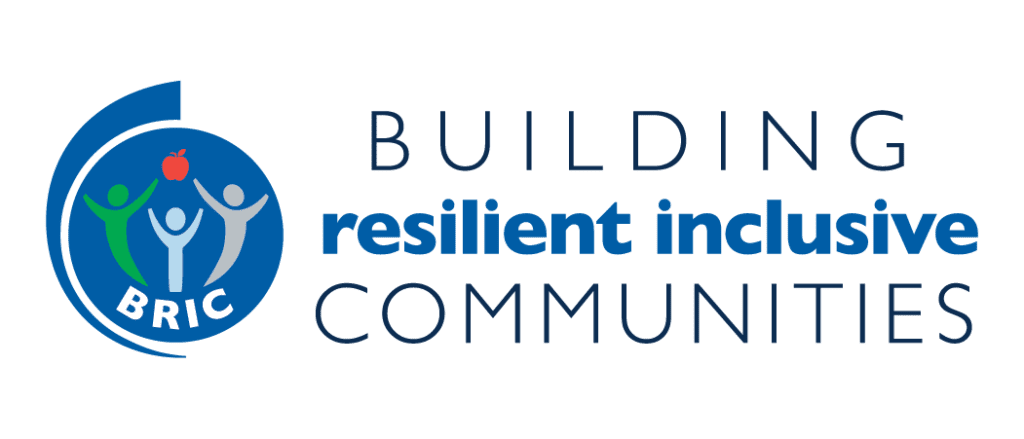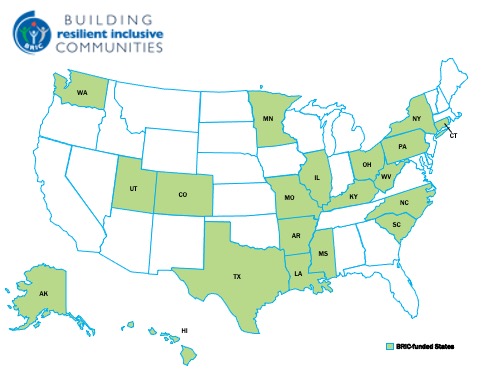Building Resilient Inclusive Communities (BRIC)
About BRIC
 Though challenges surfaced due to the COVID-19 pandemic, so have potential opportunities to support states in addressing health risk factors and increasing overall community resiliency for chronic disease prevention. In collaboration with the Centers for Disease Control and Prevention’s (CDC) Division of Nutrition, Physical Activity, and Obesity (DNPAO) and the Division of Population Health (DPH), and a team of nationally recognized experts, NACDD is working with 20 State Health Departments and other organizations to implement the Building Resilient Inclusive Communities (BRIC) program. As part of the BRIC program, states are engaging more than 60 communities to address food and nutrition security, improve safe physical activity access, and reduce social isolation and loneliness through a policy, systems, and environmental change lens. Social determinants of health, health equity, and social justice principles are integrated into the planning and implementation of all three strategy areas, in addition to accounting for the impact of the COVID-19 pandemic. States are working to impact groups at highest risk by making progress towards and achieving a combination of the following outcomes:
Though challenges surfaced due to the COVID-19 pandemic, so have potential opportunities to support states in addressing health risk factors and increasing overall community resiliency for chronic disease prevention. In collaboration with the Centers for Disease Control and Prevention’s (CDC) Division of Nutrition, Physical Activity, and Obesity (DNPAO) and the Division of Population Health (DPH), and a team of nationally recognized experts, NACDD is working with 20 State Health Departments and other organizations to implement the Building Resilient Inclusive Communities (BRIC) program. As part of the BRIC program, states are engaging more than 60 communities to address food and nutrition security, improve safe physical activity access, and reduce social isolation and loneliness through a policy, systems, and environmental change lens. Social determinants of health, health equity, and social justice principles are integrated into the planning and implementation of all three strategy areas, in addition to accounting for the impact of the COVID-19 pandemic. States are working to impact groups at highest risk by making progress towards and achieving a combination of the following outcomes:
| Outcomes | State Spotlights |
|---|---|
| • Collaborate with food policy council/coalition/task force on equitable nutrition security for food banks, pantries, and/or feeding sites during the COVID-19 pandemic | – Provide mini-grants to 5 Hawai’i Food Banks support healthier food for clients such as purchase refrigeration, and shelving. (Hawai’i County, HI) |
| • Efforts to increase number of food banks, pantries, or feeding sites in each community selected to adopt nutrition standards due to increase in demand due to the COVID-19 pandemic | – Partner with CT Foodshare to implement a series of trainings for food pantries/anchor organizations on improving equity through Supporting Wellness at Pantries and client choice implementation. (Connecticut) |
| • Efforts to support the increase in the number of people in communities who receive healthier foods distributed by food pantries, food banks, or other feeding sites, taking into consideration how demand has changed during the COVID-19 pandemic | |
| • Efforts to increase number of places providing increased financial access to healthier foods |
| Outcomes | State Spotlights |
|---|---|
| • Collaborate with task forces/coalitions that support safe, equitable physical activity during the COVID-19 pandemic | – Host NACDD’s Walkability Action Institute for up 9 Washington State communities. (Washington) |
| • Progress to support at least one local improvement plan that includes the potential assessment of local community design as it relates to improving safe and equitable access to physical activity (including number of federal, state, or local partners formally engaged) as well as how local demand had changed during the COVID-19 pandemic | – Lucas County Active Transportation Steering Committee will conduct numerous community engagement activities to gain community input for the finalized Active Transportation Plan. (Lucas County, Ohio) |
| • Efforts to support at least two verified changes in the characteristics of each selected community that demonstrate walkability or increased safety for those most at risk for COVID-19 illness and death, taking into effect how local demand has changed during the COVID-19 pandemic |
| Outcomes | State Spotlights |
|---|---|
| • Collaborate with task forces/coalitions that support equitable social connectedness during the COVID-19 pandemic | – Provide statewide training for Area Agencies on Aging on identifying sustainable evidence-based programs and policy, systems and environmental change strategies (Illinois) |
| • Efforts to implement new or improved community strategies that emphasize and integrate feasible and innovative social connectedness efforts for older adults at higher risk for severe illness from COVID-19; incorporation of existing networks of community health workers should be encouraged | – New York State Department of Health, New York State Office for the Aging, Association on Aging in New York, and DOROT have partnered to develop the “Friendly Calls Volunteer Handbook” and training videos to reduce social isolation among older adults statewide. (New York) |
| • Efforts to implement at least two new or improved equitable Intergenerational Mentoring Programs in the community to foster healthy, ongoing, supportive relationships between older adults and youth | |
| • Efforts to implement at least two new or improved equitable programs for older adults living in high burden communities that offer on-line and in-person educational, social, creative, and physical activities that encourage personal interactions, regular attendance, and community involvement working in collaboration with existing programs | |
| • Efforts to implement at least two new or improved equitable Intergenerational Mentoring Programs in the community to foster healthy, ongoing, supportive relationships between older adults and youth |

- Alaska Division of Public Health
- Arkansas Department of Health
- Colorado Department of Public Health and Environment (Year 1 only)
- Connecticut Department of Public Health
- Hawaii State Department of Health
- Illinois Public Health Institute
- Kentucky Cabinet for Health and Family Services (Year 1 only)
- Louisiana Department of Health
- Minnesota Department of Health
- Missouri Department of Health and Senior Services through an agreement with the Prevention Research Center at Washington University in St. Louis
- Mississippi State Department of Health
- North Carolina Department of Health and Human Services
- New York State Department of Health/Health Research, Inc.
- Ohio Department of Health
- Pennsylvania Department of Health
- South Carolina Department of Health and Environmental Control
- Texas Department of State Health Services through an agreement with Feeding Texas
- Utah Department of Health
- Washington State Department of Health
- West Virginia Department of Health and Human Service



Mara Galic, MHSc, RD (she/her)
Senior Program Manager
Joann Donnelly, MA, BCC, CSM (she/her)
Public Health Consultant
Leah Rimkus, MPH, RD (she/her)
Senior Program Evaluator
January 27, 2021 BRIC program Press Release
BRIC is a program of the Center for Advancing Healthy Communities.
